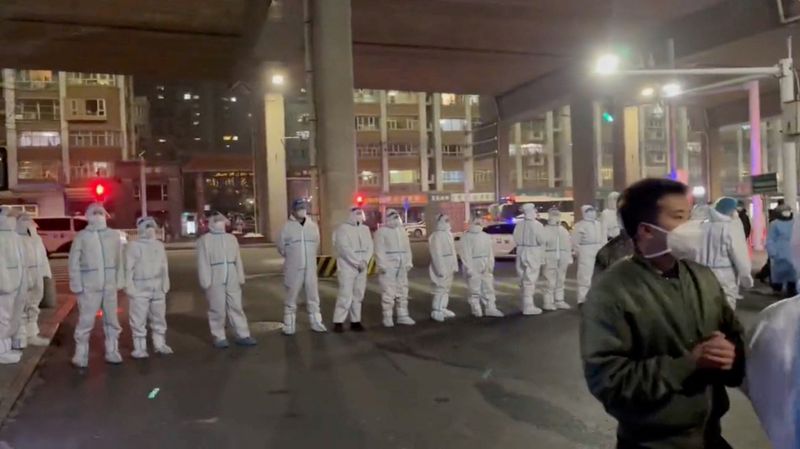Chinese cities announce further easing of COVID curbs By Reuters

© Reuters. FILE PHOTO: Protests against coronavirus disease (COVID-19) outbreak measures in Urumqi city, Xinjiang, Uygur, China in this screen grab obtained from a video released November 25, 2022. Video obtained by Reuters/via REUTERS
2/5
By Martin Quin Pollard
BEIJING (Reuters) – More Chinese cities including Urumqi in the far west announced easing of coronavirus curbs on Sunday, as China tries to make its zero-COVID policy more targeted and less onerous after extraordinary protests against restrictions last weekend.
Urumqi, the capital of the Xinjiang region and where the protests first broke out, will reopen shopping malls, markets, restaurants and other venues from Monday, authorities said, after strict lockdowns that had lasted months.
There was little sign of significant unrest this weekend, although police were out in force in the Liangmaqiao area of Beijing and in Shanghai around Wulumuqi Road, which is named after Urumqi. Both sites saw protests a week ago.
A deadly apartment fire last month in Urumqi had sparked dozens of protests against COVID curbs in over 20 cities, a show of civil disobediance unprecedented in mainland China since President Xi Jinping took power in 2012.
In recent days, numerous cities have announced easings of lockdowns, testing requirements, and quarantine rules.
China is set to further announce a nationwide easing of testing requirements as well as allowing positive cases and close contacts to isolate at home under certain conditions, people familiar with the matter told Reuters last week.
Vice Premier Sun Chunlan, who oversees COVID efforts, said last week the ability of the virus to cause disease was weakening – a change in messaging that aligns with what health authorities around the world have said for more than a year.
LOCAL CHANGES
Easing measures have varied across the country.
On Sunday, the city of Nanning, capital of the southern region of Guangxi, cancelled the requirement for a negative COVID test within 72 hours to take the subway.
On Saturday in Beijing, local authorities said purchasing fever, cough and sore throat medicines no longer requires real name registration. That followed on from local-level announcements in recent days in the capital that those who test positive for the virus could quarantine at home.
In Beijing and Wuhan, people expressed frustration over the weekend because recent negative tests were still required for entry into a number of venues, despite the mass closing of COVID testing booths, causing lengthy queues at those few still open.
“Are they stupid or just plain mean?” a Weibo (NASDAQ:) user posted on Sunday. “We shouldn’t shut down COVID testing stations until we get rid of the COVID test pass.”
New daily case numbers dropped nationwide to 31,824, authorities said on Sunday, which may be due in part to fewer people being tested due to loosening curbs. China on Sunday reported two new deaths from the virus.
GLOBAL OUTLIER
Xi’s zero-COVID policy has made China a global outlier nearly three years into the pandemic, which started in the central Chinese city of Wuhan. In addition to sparking rising frustration, the policy has had a devastating impact on the world’s second-largest economy and roiled global supply chains.
China argues the policy, which has all-but-shut its borders to travel, is necessary to save lives and prevent the health care system from being overwhelmed.
Despite recent easings, many experts said China is unlikely to begin significant reopening before March at the earliest, given the need to ramp up vaccinations, especially among its vast elderly population.
“Although there have been quite a few local changes to COVID policies lately, we do not interpret them as China abandoning zero-COVID policy (ZCP) just yet,” Goldman Sachs (NYSE:) said in a note on Sunday.
“Rather, we see them as clear evidence of the Chinese government preparing for an exit, and trying to minimize the economic and social cost of COVID control in the meantime. The preparations may last a few months and there are likely to be challenges along the way.”
Estimates for how many deaths China could see if it pivots to a full reopening have ranged from 1.3 million to over 2 million, though some researchers said the death toll could be reduced sharply if there was a focus on vaccination.
Earlier this week, China announced it would speed up COVID-19 vaccinations for elderly people, but many remain reluctant about getting the jab. “Some people have doubts about the safety and effectiveness of the country’s new coronavirus vaccine, believing that vaccination of the elderly may be dangerous,” an article in the ruling Communist Party’s official People’s Daily said on Sunday.
“Experts say this perception is wrong,” the article added, before emphasising that domestically made vaccines are “safe”.
Foreign COVID vaccines are not approved in China and Xi is unwilling to change that, U.S. Director of National Intelligence Avril Haines said on Saturday.
For all the latest Business News Click Here
For the latest news and updates, follow us on Google News.
